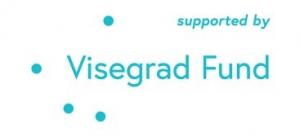The educational programme HOBIT has tested almost 1 700 pupils from the Visegrad Group countries (V4)
Czechia, Slovakia, Poland and Hungary have all participated in the V4 HOBIT project: Saving lives in V4 through medical education in schools. Through e-learning activities, pupils from almost 30 primary and secondary schools have learnt to recognise symptoms of stroke and heart attack, and how to provide first aid to those affected. Due to this project, we have managed to expand this successful educational programme abroad.
The programme HOBIT has been operating in Czech schools since 2014. However, it is a novelty for teachers and pupils from the other three countries of the Visegrad Group. Ľubica Fidesová from the GrapePR agency commented on the project: “We are delighted about the high participation rate of Slovakian pupils who have taken part in this international educational programme. Almost 750 pupils have learnt to recognise the symptoms of stroke and heart attack, and how to act appropriately when encountering a person displaying these symptoms.” Out of the V4 countries, Slovakia has been recognised as the country with the highest rate of pupils that have participated in the V4 HOBIT project.
The largest number of Slovakian schools that have participated in the project came from the town of Košice. However, other schools from Bratislava, Povážská Bystrica and Trstené have also joined in. In Poland, most of the schools that took part were from the city of Krakow, whereas in Hungary, the base of participating schools was wider, for example Szeged, Nyírbátor, Zalaegerszeg or Szigetszentmiklós, just to name a few.
HOBIT educates through the use of simulation scenarios
The HOBIT e-learning programme consists of three parts. Firstly, students go through a short section of a few questions that test them on how much they already know about stroke and heart attack. Then, pupils watch the educational videos of simulation scenarios before they are tested again on how much they have learnt. “The children really enjoyed the project. They found the videos very stimulating and they were able to learn how to react in critical and life-threatening situations,” said the biology teacher Jana Hájková.
In the school year 2021/2022, approximately 1700 pupils from the V4 countries have completed the first round of testing. The students will repeat the e-learning programme and testing again in the coming weeks. As a result, the researchers from the Cerebrovascular team at the International Clinical Research Centre at St. Ann´s University Hospital in Brno will be able to evaluate the overall effectiveness of this international educational V4 programme named HOBIT.
“The implementation of this project led to the collection of data on how the young generation is able to recognise symptoms of these medical conditions and react in an appropriate manner. We have also recognised how much our programme contributes to increasing children’s knowledge regarding health,” said the Programm HOBIT Coordinator Renata Hejnová.
In each of the participating countries, the pupils´ knowledge of the individual medical conditions have increased. The highest improvement was detected in Slovakia where the figures rose from an average 44.8 % (success rate in the first round of questions) to 59.5 % (success rate in the second round of questions). The most insignificant difference between the first and second round of testing questions was observed in Poland. While Polish pupils passed the first test with an average success rate of 53.5 %, they achieved a result of 57 % in the final round of questions.
Some teachers have already expressed that the programme is very reasonable. “These medical conditions (stroke and heart attack) are part of our everyday lives. We can encounter a person displaying these symptoms at any time. Pupils embrace the programme with an enthusiasm of learning something new that they can use in real life. They no longer feel helpless in critical situations,” said the teacher Gabriela Milsinerová.
The V4 HOBIT project was launched in March 2021. The programme is coordinated by the Cerebrovascular Team from the International Clinical Research Centre at Saint Anne´s University Hospital in Brno and it works in partnership with Semmelweis University, Jagiellonian University a Univerzitná nemocnica L. Pasteura.
The implementation of the project was led by the GrapePR agency in Slovakia, Agencja Pretty Good in Poland and Diamond Agency in Hungary. Within the Czech Republic, we have approached the same schools that have participated in the HOBIT programme in previous years.
The project is co-financed by the Governments of Czechia, Hungary, Poland and Slovakia through the Visegrad Grants from the International Visegrad Fund. The main aim of the fund is to advance ideas for a sustainable regional cooperation in the Central Europe.

